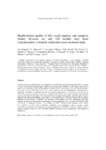Mostrar o rexistro simple do ítem
Health‐related quality of life, social support, and caregiver burden between six and 120 months after heart transplantation: a Spanish multicenter cross‐sectional study
| dc.contributor.author | Delgado Jiménez, Juan Francisco | |
| dc.contributor.author | Almenar-Bonet, Luis | |
| dc.contributor.author | González-Vílchez, Francisco | |
| dc.contributor.author | Arizón-del-Prado, José M. | |
| dc.contributor.author | Gómez-Bueno, Manuel | |
| dc.contributor.author | De la Fuente-Galán, Luis | |
| dc.contributor.author | Brossa-Loidi, Vicens | |
| dc.contributor.author | Fernández-Yáñez, Juan | |
| dc.contributor.author | Díaz Molina, Beatriz | |
| dc.contributor.author | Pascual Figal, Domingo A. | |
| dc.contributor.author | Lage-Gallé, Ernesto | |
| dc.contributor.author | Sanz-Julve, Marisa | |
| dc.contributor.author | Manito-Lorite, Nicolás | |
| dc.contributor.author | Crespo-Leiro, María Generosa | |
| dc.date.accessioned | 2019-06-06T10:28:25Z | |
| dc.date.available | 2019-06-06T10:28:25Z | |
| dc.date.issued | 2015-06-15 | |
| dc.identifier.citation | Delgado JF, Almenar L, González-Vílchez F, et al. Health‐related quality of life, social support, and caregiver burden between six and 120 months after heart transplantation: a Spanish multicenter cross‐sectional study. Clin Transplant. 2015; 29(9): 771-780 | es_ES |
| dc.identifier.issn | 0902-0063 | |
| dc.identifier.uri | http://hdl.handle.net/2183/23146 | |
| dc.description.abstract | [Abstract] A multicenter cross-sectional study was conducted to determine the current heart transplant (HTx) outcomes in Spain. Clinical and functional status, health-related quality of life (HRQoL), social support, and caregiver burden were analyzed in 303 adult transplant recipients (77.9% males) living with one functioning graft. Mean age at time of HTx (SD) was 56.4 (11.4) years, and the reason for transplantation in all patients was congestive heart failure. All patients had received a first heart transplant 6 (± 1), 12 (± 2), 36 (± 6), 60 (± 10), or 120 (± 20) months previously. Participants completed the Kansas City Cardiomyopathy Questionnaire (KCCQ), the EQ-5D, the Duke-UNC Functional Social Support Questionnaire, and the Zarit Caregiver Burden Scale. Reasonable HRQoL, social support, and caregiver burden levels were found at all time points, although a slight decrease in HRQoL was recorded at 120 months (p ≤ 0.033). Multivariate regression analyses showed that complications, comorbidities, and hospitalizations were associated with HRQoL (EQ-5D: 48.4% of explained variance, F4,164 = 38.46, p < 0.001; KCCQ overall summary score: 45.0%, F3,198 = 54.073, p < 0.001). Patient functional capabilities and complications affected caregiver burden (p < 0.05). In conclusion, HTx patients reported reasonable levels of HRQoL with low caregiver burden. Clinical variables related to these outcomes included functional status, complications, and number of admissions. | es_ES |
| dc.language.iso | eng | es_ES |
| dc.publisher | Wiley | es_ES |
| dc.relation.uri | https://doi.org/10.1111/ctr.12578 | es_ES |
| dc.rights | This is the peer reviewed version of the article which has been published in final form at Wiley Online library. This article may be used for non commercial purposes in accordance with Wiley Terms and Conditions for self-archiving | es_ES |
| dc.subject | Caregiver | es_ES |
| dc.subject | Comorbidity | es_ES |
| dc.subject | Heart transplantation | es_ES |
| dc.subject | Outcome assessment | es_ES |
| dc.subject | Quality of life | es_ES |
| dc.title | Health‐related quality of life, social support, and caregiver burden between six and 120 months after heart transplantation: a Spanish multicenter cross‐sectional study | es_ES |
| dc.type | info:eu-repo/semantics/article | es_ES |
| dc.rights.access | info:eu-repo/semantics/openAccess | es_ES |
| UDC.journalTitle | Clinical Transplantation | es_ES |
| UDC.volume | 29 | es_ES |
| UDC.issue | 9 | es_ES |
| UDC.startPage | 771 | es_ES |
| UDC.endPage | 780 | es_ES |
Ficheiros no ítem
Este ítem aparece na(s) seguinte(s) colección(s)
-
INIBIC-ICATC - Artigos [177]






